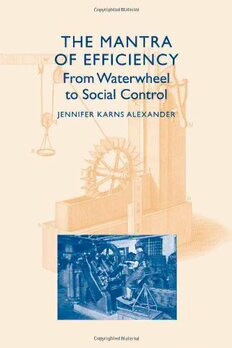
The Mantra of Efficiency: From Waterwheel to Social Control PDF
254 Pages·2008·1.739 MB·English
Most books are stored in the elastic cloud where traffic is expensive. For this reason, we have a limit on daily download.
Preview The Mantra of Efficiency: From Waterwheel to Social Control
Description:
Efficiency -- associated with individual discipline, superior management, and increased profits or productivity -- often counts as one of the highest virtues in Western culture. But what does it mean, exactly, to be efficient? How did this concept evolve from a means for evaluating simple machines to the mantra of progress and a prerequisite for success?In this provocative and ambitious study, Jennifer Karns Alexander explores the growing power of efficiency in the post-industrial West. Examining the ways the concept has appeared in modern history -- from a benign measure of the thermal economy of a machine to its widespread application to personal behaviors like chewing habits, spending choices, and shop floor movements to its controversial use as a measure of the business success of American slavery -- she argues that beneath efficiency's seemingly endless variety lies a common theme: the pursuit of mastery through techniques of surveillance, discipline, and control. Six historical case studies -- two from Britain, one each from France and Germany, and two from the United States -- illustrate the concept's fascinating development and provide context for the meanings of, and uses for, efficiency today and in the future. (March 2009)
See more
The list of books you might like
Most books are stored in the elastic cloud where traffic is expensive. For this reason, we have a limit on daily download.
